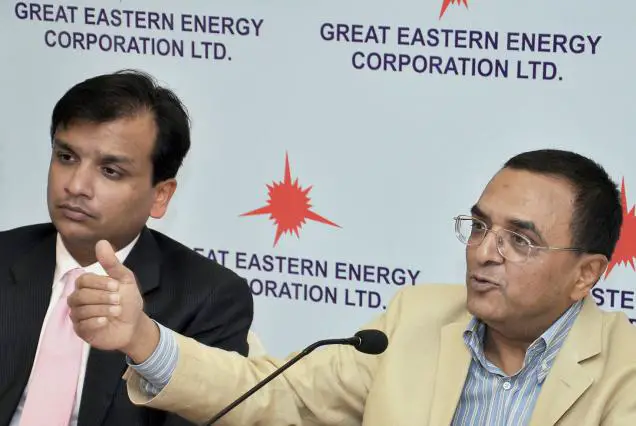By Zhang Huizhong from the People’s Daily
“The B20 activities have been tuned towards the needs of the global economy currently. Maybe, the G20 governments should be made more responsive towards the activities and recommendations of the B20,” said Yogendra Kumar Modi, executive chairman of the Great Eastern Energy Corporation Ltd., when speaking about this year’s Business 20, or B20 summit.
As a member of the UN’s International Labour Organization governing body for over a decade, and an industrialist working closely with labor since he was 18, Modi has strong views on employment and labor issues. Speaking about his thoughts on handling the current situation of employment and labor, Modi said he believes that “the fundamental issue to solve the question of job creation is to maintain growth momentum. At the same time, growth must be employment friendly.”
Modi offered four proposals to bring down unemployment. First, take care of those who create jobs so as to achieve the twin-objective of job creation and growth. Modi especially addressed the importance of supporting small and medium enterprises (SMEs). He believes SMEs offer the largest number of jobs, “If the manufacturing sector is to contribute more to the GDP and create more employment, this has to be through SMEs”. In Modi’s perspective, encouraging entrepreneurship and enterprises is an effective way to develop SMEs.
Second, encouraging self-employment, more particularly among the youth is helpful to job creation.
Third, a positive approach to the legal framework for employment and labor is crucial for job creation. Modi believed that “We should have an Employment Policy rather than a Labor Policy”, and “the labor laws should be flexible so that employers feel confident about hiring fresh hands.” “Employers should feel that labor is an asset, not a liability,” said Modi.
Forth, skills formation is the key to ensuring employment. Modi suggested that workers should “develop skills which are in demand in local industries”, and “a market driven approach for skill development would be necessary for resolving these issues.”
Referring to Chinese companies’ performance in the development of policy recommendations of the Employment Taskforce, Modi expressed his appreciation of Chinese companies’ extremely valuable insights into labor and employment creation.
“Chinese companies are doing a commendable job in helping these platforms evolve global rule-making. There should be parity with developed countries and rules should not always reflect their priorities and demands,” Modi stressed.
Meanwhile, Modi suggested that Chinese companies be more interactive and accommodate the viewpoints of peer groups from emerging market economies (EMEs) and other developing countries. “They should provide more access to domestic Chinese markets and also open up investment from other developing countries in their country. These companies should be given ‘national treatment’ once they are in China.”
“The B20 activities have been tuned towards the needs of the global economy currently. Maybe, the G20 governments should be made more responsive towards the activities and recommendations of the B20,” said Yogendra Kumar Modi, executive chairman of the Great Eastern Energy Corporation Ltd., when speaking about this year’s Business 20, or B20 summit.
As a member of the UN’s International Labour Organization governing body for over a decade, and an industrialist working closely with labor since he was 18, Modi has strong views on employment and labor issues. Speaking about his thoughts on handling the current situation of employment and labor, Modi said he believes that “the fundamental issue to solve the question of job creation is to maintain growth momentum. At the same time, growth must be employment friendly.”
Modi offered four proposals to bring down unemployment. First, take care of those who create jobs so as to achieve the twin-objective of job creation and growth. Modi especially addressed the importance of supporting small and medium enterprises (SMEs). He believes SMEs offer the largest number of jobs, “If the manufacturing sector is to contribute more to the GDP and create more employment, this has to be through SMEs”. In Modi’s perspective, encouraging entrepreneurship and enterprises is an effective way to develop SMEs.
Second, encouraging self-employment, more particularly among the youth is helpful to job creation.
Third, a positive approach to the legal framework for employment and labor is crucial for job creation. Modi believed that “We should have an Employment Policy rather than a Labor Policy”, and “the labor laws should be flexible so that employers feel confident about hiring fresh hands.” “Employers should feel that labor is an asset, not a liability,” said Modi.
Forth, skills formation is the key to ensuring employment. Modi suggested that workers should “develop skills which are in demand in local industries”, and “a market driven approach for skill development would be necessary for resolving these issues.”
Referring to Chinese companies’ performance in the development of policy recommendations of the Employment Taskforce, Modi expressed his appreciation of Chinese companies’ extremely valuable insights into labor and employment creation.
“Chinese companies are doing a commendable job in helping these platforms evolve global rule-making. There should be parity with developed countries and rules should not always reflect their priorities and demands,” Modi stressed.
Meanwhile, Modi suggested that Chinese companies be more interactive and accommodate the viewpoints of peer groups from emerging market economies (EMEs) and other developing countries. “They should provide more access to domestic Chinese markets and also open up investment from other developing countries in their country. These companies should be given ‘national treatment’ once they are in China.”
 Menu
Menu
 Yogendra Kumar Modi, Co-Chairman of the B20’s Employment Taskforce hopes G20 Summit will be more responsive to B20recommendations
Yogendra Kumar Modi, Co-Chairman of the B20’s Employment Taskforce hopes G20 Summit will be more responsive to B20recommendations

















